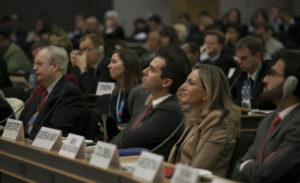By Stephanie Vélez*

Forum on Business and Human Rights, U.S. Mission Geneva, Photo by Eric Bridiers Photo licenced under CC BY-SA 4.0
Following the 6th UN Forum on Business and Human Rights that took place in Geneva last week, you may be forgiven for wondering whether these high-level get-togethers ever change anything for people on the ground – for workers in garment factories and on farms toiling away for hours a day yet still stuck in poverty and some, with no knowledge of their rights.
When I was doing my Masters in Understanding and Securing Human Rights in 2011-12, I thought exactly that. The UN Global Compact was relatively new (2005) and John Ruggie’s Guiding Principles on Business and Human Rights had only just been endorsed, making the framework the first corporate human rights responsibility initiative to be endorsed by the United Nations. I too thought, there’s just no point unless it’s mandatory, you’ll only get the more advanced companies signing up without creating a level playing field, allowing the others to continue with business as usual, which may be having adverse human rights impacts on people in their supply chains.
But I’m happy to say that things are changing. In 2015, the word ‘TISC’ became very exciting, and not in a condescending way. It was muttered around multi-stakeholder meetings as a game changer – the Transparency in Supply Chains Clause brought forward by the UK government in the Modern Slavery Act. The clause wouldn’t even have made it in if it weren’t for companies campaigning and lobbying, challenging the government’s supposition that corporates dislike regulation. The clause requires companies with a turnover of £36 million or more (the Companies Act definition of a medium-sized company) to write an annual statement about what they’re doing to tackle slavery and human trafficking in their businesses and supply chains. This statement must be signed by a director and posted on the company’s website with a link from the homepage.
Two years on, we are now at the stage where every eligible company should have posted its first statement. Unfortunately, the government didn’t introduce a monitoring mechanism for this, but as can be expected, the NGOs and consultants are on it. They are gathering as much evidence as they can as to who hasn’t written a statement and have also started benchmarking the quality of the content. Ergon Associates have published anonymised reports based on how well companies report according to the government guidance and the Business & Human Rights Resource Centre recently ranked the top FTSE 100 companies on their statements.
Alongside these benchmarks looking only at modern slavery statements, there are now a handful of benchmarks assessing companies’ broader attitude and actions on human rights. This is encouraging – 5 years ago you couldn’t even mention the words ‘human rights’ to most Board executives but now they’re sitting up and paying attention.
Know the Chain looks at companies’ activities around fighting forced labour across the ICT, food & beverage and apparel & footwear sectors and Oxfam is about to launch a human rights risk assessment tool for food and agricultural supply chains. The first results from the Corporate Human Rights Benchmark were released in March this year and although it seems ironic that a multinational mining, metals and petroleum company enshrouded in environmental disasters could come out top, no company scored more than 69%. The Workforce Disclosure Initiative, endorsed by more than $8 trillion worth of asset management investors and which we’re advising on at Lake Advisory seeks, via a survey, to understand the type of data companies gather and hold on their own employees and on workers in their supply chains. It’s designed to send signals to companies that they should start collecting these types of data as investors begin to use innovative ways of assessing a company’s performance which includes human rights.
Most of these benchmarks assess publicly available information which is driving a huge push towards greater transparency – and as many CSR professionals realise, if you’re not sitting at the table – you’ll be on the menu.
* Stephanie Vélez works for Lake Advisory, an independent consultancy specialising in responsible sourcing and sustainability. Lake Advisory works with businesses, investors, non-profits and governments to drive greater transparency, responsibility and efficiency in global supply chains.

